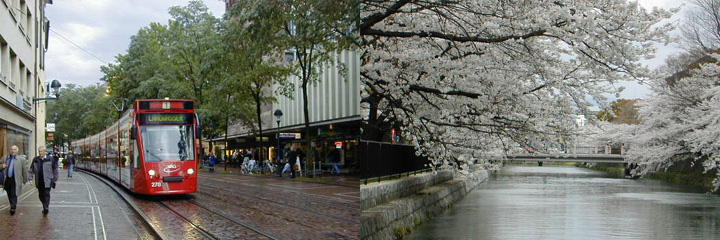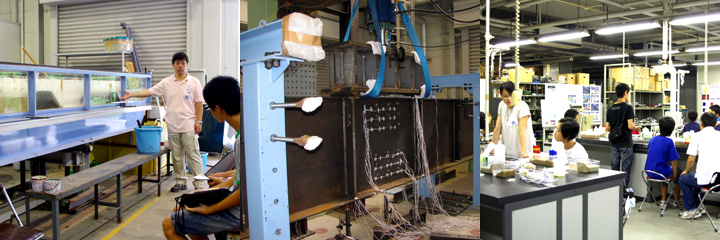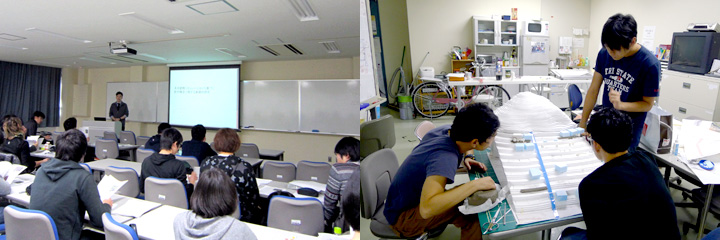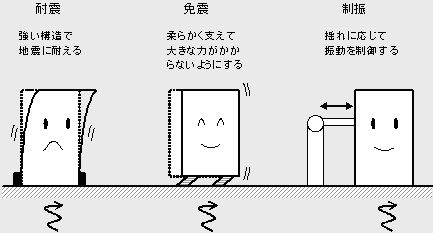 <Department of Civil Engineering >
<Department of Civil Engineering >
Protecting people's lives is not the exclusive territory of the field of medicine. Urban infrastructures (and social infrastructures) have to be designed well for people to be safe. It is the goal of the new Department of Civil Engineering to promote engineering that protects people's lives and ensures their safety. All over the world, people are facing various disasters including natural disasters, traffic challenges, and environmental catastrophes. Urban restoration planning and disaster prevention efforts aimed at improving safety have to be undertaken for people to live safe and comfortable lives. In recent times, there have been increasing demands on engineers to maintain and manage the infrastructure not only in the narrow sense of roads and bridges, but also in the broader sense that includes the cultural treasures and cultural properties of cities. New engineers and technicians are expected to become active in developing proposals for new urban transportation systems and waterside spaces with enriching urban attractions.

The new Department of Civil Engineering strives to teach students the essentials of the continuous flow from the urban planning phase to design, construction, and maintenance, and helps them learn the skills they need for managing the entire process. As a foundation for mastering these skills, students will gain knowledge of theoretical principles, mechanical basics, and the social sciences. This is your chance to become an engineer who will build the urban systems of the future.

Civil service, general contracting, consulting (design, planning), railroads, electricity, natural gas, bridge pier building
A Word of Advice:
For a future position in civil service, the Department of Civil Engineering is the place. Every year the former Department of Civil Engineering has turned out graduates who went on to pass the civil service exam.
| Last Year's Results (Former Department of Civil Engineering) |
| By Industry | Undergraduate program graduates | Institute graduate | Graduate school graduates |
| National government (Ministry of Land, Infrastructure and Transport, other national agencies) | 3 | 0 | 1 |
| Local government (prefectural and city governments) | 12 | 2 | 3 |
| Railroads / Electricity / Natural Gas | 1 | 0 | 2 |
| Construction companies | 7 | 3 | 4 |
| Consulting | 3 | 0 | 16 |
| Concrete | 1 | 0 | 1 |
| Environment-related | 1 | 0 | 0 |
| Housing industry | 11 | 3 | 1 |
| Information industry | 1 | 3 | 3 |
1. Sustainability
When thinking about the environment in which our society exists, some skeptically ask how the human race will be able to continue to sustain itself at the level that it has become used to. Achieving sustainability requires an adequate understanding of urban systems. People are demanding that modern cities offer new values that go beyond safety and convenience to include lifestyle compatibility and traditional regionalism. Many issues need to be addressed in such areas as natural disaster and structural degradation countermeasures, and finding solutions to these issues is the key to achieving a sustainable society. New human resources are needed who have the ability to see cities as systems.
2. Seismic Resistance / Seismic Isolation
A variety of seismic resistance technologies have been developed to create structures that are resistant against earthquakes. Society has demanded the development of structures that can withstand the force of earthquakes. Recently, however, progress has been made in seismic isolation technologies, which make it difficult for buildings to experience the full strength of an earthquake. Many seismic isolation structures have been built since the Great Hanshin-Awaji Earthquake of 1995. Also, vibration control technologies that control the shaking caused by earthquakes (or wind) have also been put into use. The greatest role of the new Department of Civil Engineering is to contribute to the application of the latest scientific and technological developments in real life situations.

Seismic Resistance / Seismic Isolation








